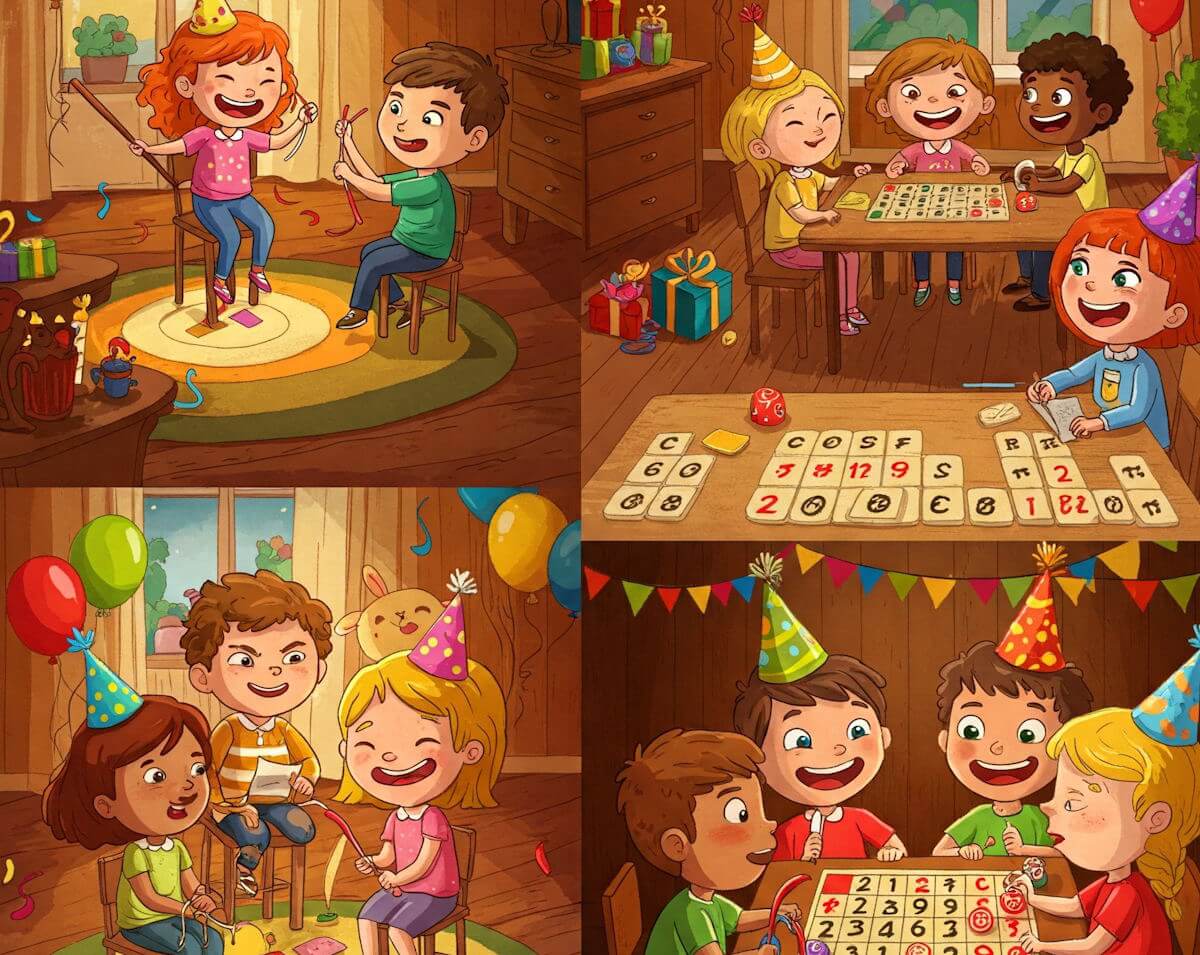Party games play a crucial role in social gatherings, particularly for children. These activities are specifically designed to foster interaction, encourage teamwork, and cultivate creativity among young participants. During events such as birthdays, school parties, or family reunions, party games create an environment where children can bond, share experiences, and develop friendships. The structured yet playful nature of these games allows for a balance between competition and collaboration, ensuring that all children feel included and engaged.
The significance of party games extends beyond mere entertainment. By participating in these activities, children enhance their critical thinking and problem-solving skills while also learning valuable lessons in sportsmanship and empathy. These experiences contribute to emotional and social development, encouraging youngsters to express themselves in a supportive environment. Furthermore, party games stimulate imagination and creativity, as children often adapt rules or create new games, showcasing their ability to think outside the box.
In addition, party games can cater to various age groups, making them versatile options for parties comprising children of different ages. This inclusiveness ensures that everyone can partake and enjoy the festivities, making it essential for organizers to choose age-appropriate games that can be easily understood and enjoyed by all. Whether it is a classic game like musical chairs or a modern favorite such as inflatable obstacle courses, the choices are abundant and can be tailored to suit the specific interests of the participants.
The upcoming sections will delve into specific party games, highlighting their characteristics and how they can be incorporated into gatherings for an unforgettable experience filled with laughter and joy.
Benefits of Playing Party Games
Engaging children in party games offers a multitude of benefits that significantly contribute to their overall development. One of the primary advantages is the enhancement of social skills. When children participate in organized games, they learn to communicate effectively, share, and take turns. These interactions foster important relationships and help to build a sense of community among peers, which is vital for their social growth.
Teamwork and collaboration are further emphasized through party games. Many of these activities require children to work together to achieve common goals, teaching them the importance of cooperation and the value of diverse skills and perspectives within a team setting. Through these experiences, they gain an understanding of roles within a group, enhancing not only their interpersonal skills but also their ability to function effectively in social situations.
Physical activity is another significant benefit associated with party games. Many of these games involve movement, which promotes physical health and fitness in children. Regular physical activity can help combat sedentary behaviors, improve motor skills, and contribute to a healthier lifestyle. Furthermore, the sheer enjoyment that comes from playing active games encourages children to engage in physical pursuits, establishing habits that can last a lifetime.
In addition to fostering social interaction and physical health, party games also promote creativity and imagination. Many games allow kids to invent their own rules or adapt to unique challenges, which encourages them to think outside the box and solve problems creatively. This form of imaginative play is crucial for cognitive development, as it stimulates critical thinking and fosters a love for exploration and discovery.
Ultimately, participating in party games provides comprehensive benefits that extend beyond mere entertainment, forming a positive foundation for lifelong skills and attributes essential for healthy development in children.
Age-Appropriate Games for Toddlers (1-3 years old)
When organizing a party for toddlers aged one to three years old, it is essential to select games that cater to their developmental stage. At this age, children are primarily engaged in sensory play, where they explore the world through touch, sound, and sight. Therefore, party games should be designed to be simple yet stimulating, encouraging motor skill development and interactive engagement.
One popular game for toddlers is the classic “Bubble Pop.” This game involves blowing bubbles for the children to chase and pop. Bubbles captivate toddlers with their floating nature, encouraging them to run and jump. This activity not only enhances their gross motor skills but also helps improve their hand-eye coordination as they attempt to pop the bubbles. Additionally, incorporating colorful bubbles can further attract their attention and stimulate their visual senses.
Another engaging option is a “Rainbow Sensory Hunt.” In this game, parents can hide colorful objects around a designated play area and guide the toddlers in finding them. This activity incorporates a simple element of treasure hunting, where children can discover objects of different colors, promoting color recognition and cognitive skills. The tactile aspect of holding various items stimulates their sense of touch and exploration.
For musical interaction, “Musical Mats” is an excellent choice. Using a variety of soft mats with different colors and textures, music can be played, and when it stops, children should find a mat to stand on. This game encourages listening skills, balance, and the opportunity to engage with peers. Importantly, it ensures safety while promoting active play, as the mats provide cushioning.
In summary, games for toddlers should emphasize simplicity and sensory engagement. By incorporating activities like Bubble Pop, Rainbow Sensory Hunt, and Musical Mats, children can interactively play while developing crucial skills in a safe environment, making the party enjoyable and memorable for all.
Fun Games for Preschoolers (4-5 years old)
Engaging preschoolers in play is an essential aspect of their development. During this age, children are brimming with curiosity, and games that promote learning while ensuring fun can be particularly beneficial. Here are several enjoyable games suitable for preschoolers that can stimulate both cognitive and social skills.
One popular game is “Simon Says.” This classic game not only provides a platform for children to follow instructions but also fosters their listening skills. The game is simple: one player acts as “Simon” and gives commands, such as “Simon says touch your toes.” If Simon issues a command without prefacing it with “Simon says,” players must avoid following the order. The last child remaining in the game wins and can become the next Simon, encouraging engagement and excitement.
Another engaging option is “Musical Chairs.” This game combines music and movement, promoting coordination and social interaction. Set up chairs in a circle, ensuring there is one fewer chair than the number of players. As music plays, children walk around the chairs until it stops. At that point, everyone must find a seat. The player left standing is out, leading to a fun elimination process. It’s a fantastic way for children to learn about graciously accepting defeat and working together in a lively atmosphere.
For a more hands-on approach, “Treasure Hunt” is an excellent choice. Prepare a simple treasure map or a list of objects that can be hidden around the party venue. Children can work in pairs or groups to find the hidden treasures, promoting cooperation and problem-solving. This game encourages exploration and is customizable based on the environment, making it perfect for home or outdoor gatherings.
These games not only provide entertainment but are also critical tools for early childhood development, striking the right balance between fun and learning for preschoolers.
Creative Activities for Early School Age Kids (6-8 years old)
At the age of six to eight years, children are developing essential cognitive and social skills, making this a perfect time to introduce creative party games that challenge their minds and bodies. Engaging in activities that require teamwork and problem-solving fosters collaboration and communication among peers. One exciting game tailored for this age group is the “Treasure Hunt.” In this game, children form small teams, receiving clues that lead them to hidden treasures around a designated area. This game not only encourages physical activity but also fosters critical thinking as they decipher clues collectively.
Another engaging activity is “Obstacle Course Relay.” This game consists of various physical challenges set up in a course that participants must complete in teams. By incorporating elements such as jumping over hurdles, crawling under ropes, or balancing on beams, kids improve their coordination and agility while working together to reach a common goal. The relay format promotes healthy competition and inspires participants to cheer for their teammates.
“Creative Story Building” is another excellent option to ignite creativity. Children sit in a circle and take turns adding a sentence to a growing story. This game not only enhances their imaginative skills but also teaches them the importance of listening and building on each other’s ideas. It can be a delightful experience as unexpected twists and turns in the narrative emerge from collaborative effort.
Finally, “Arts and Crafts Team Challenge” allows kids to express their artistic abilities while collaborating to create group projects. Whether it’s a mural, a sculpture, or themed decorations for the party, this activity fosters teamwork and collective goal setting. As they engage in these creative activities, early elementary school children hone their intellectual and physical fitness, reinforcing skills that are vital for their development and enjoyment.
Interactive Games for Pre-teens
As children enter the pre-teen stage, their interests evolve, and they often seek more intellectually stimulating and socially engaging activities. Developing a selection of interactive games tailored for pre-teens between the ages of 9 and 12 can significantly enhance their social skills while allowing for fun and entertainment. Here are some popular games that provide strategic challenges and encourage teamwork.
One standout is “Capture the Flag,” a classic outdoor activity that involves two teams attempting to capture each other’s flag while defending their own. This game promotes physical fitness, strategic thinking, and collaboration among players as they devise tactics to outsmart the opposing team. The thrill of the chase and the element of stealth create an exciting atmosphere that pre-teens find captivating.
Another engaging option is “Mafia,” a social deduction game where players assume different roles that can either be innocent townsfolk or cunning mafia members. Through lively discussions and clever reasoning, players must identify the mafia while simultaneously trying to deceive others. This game fosters critical thinking, persuasive speech, and teamwork, making it an excellent choice for gatherings.
For those who enjoy a more creative outlet, “Charades” can provide endless entertainment. Players take turns acting out words or phrases without speaking while others attempt to guess what it is. This game promotes imagination, communication, and non-verbal skills, helping players express themselves in dynamic ways.
Lastly, “Scavenger Hunt” is a versatile game that can be tailored for both indoor and outdoor settings. Participants are given a list of items to find within a specific timeframe. This game not only heightens problem-solving skills but also encourages exploration and teamwork as children work together to complete the hunt successfully.
By incorporating these interactive and engaging games into party planning for pre-teens, organizers can ensure a memorable experience that nurtures socialization and friendly competition.
Outdoor Party Games for Active Play
Engaging children in outdoor party games fosters not only physical fitness but also enhances their social skills. One of the oldest and most beloved outdoor activities is tag, which combines speed and strategy. In this timeless game, one child is designated as “it,” and must chase and attempt to touch other players. The simplicity of the rules and the thrill of evasion contribute to an exciting environment that encourages children to run, think quickly, and communicate effectively.
Treasure hunts are another fantastic option for outdoor play. This game can be customized to fit any theme, adding an element of adventure. Children work in teams or individually to follow clues leading to hidden treasures. This activity promotes problem-solving skills and teamwork, as kids must collaborate to decipher clues and navigate through the outdoors. Additionally, as they explore their surroundings, they become acquainted with nature, which can enhance their appreciation for the environment.
Relay races provide another excellent opportunity for a mixture of fun and physicality. These races can include various tasks, such as running, hopping, or balancing an object. Encouraging kids to work together fosters camaraderie, while the friendly competition promotes persistence and goal-setting. Setting up a course using cones or other markers, and dividing participants into teams, can create an electrifying atmosphere where children cheer for one another and learn the value of sportsmanship.
Incorporating these outdoor games not only ensures that children remain active but also enriches their social interactions. The benefits of outdoor play are significant, as they not only improve physical health but also help develop important life skills. By engaging in games like tag, treasure hunts, and relay races, children have the opportunity to build friendships and create lasting memories in a fun, active environment.
Inclusive Games for All Abilities
Creating an inclusive environment during party games is crucial for ensuring that all children, regardless of their abilities, can fully participate and enjoy themselves. This aspect of party planning not only promotes a sense of belonging but also fosters social interactions among children with varying skill sets. When selecting games, it is important to consider modifications that can enhance accessibility and provide equal opportunities for engagement.
One example of a highly adaptable game is a relay race. For children who may have mobility challenges, consider using a rolling ball or a modified version of the race that allows participants to move at their own pace. This way, all players can compete without feeling overwhelmed. Incorporating team-based elements can also promote collaboration, allowing children to work together, regardless of individual abilities.
Another enjoyable option is a scavenger hunt. This activity can be tailored to suit different skill levels by providing various types of clues or tasks that cater to diverse capabilities. For example, visual clues for children who might struggle with reading can be beneficial, while auditory clues can assist those who may have difficulty seeing. Customizing the difficulty of each task ensures that every child can contribute to the team’s success and feel a sense of achievement.
Adaptive board games represent another fantastic choice for inclusive play. Games that promote cooperative play rather than competition can help emphasize teamwork and inclusivity. These board games can be modified by utilizing larger game pieces or simplifying rules to accommodate varying abilities, ensuring that every child feels engaged and valued in the gameplay experience.
Incorporating inclusive games fosters an atmosphere where children learn the importance of empathy and support for their peers. It is essential to remain vigilant in creating a playful environment, and making modifications as needed helps all children experience the joy of play. By prioritizing inclusivity in party games, everyone has the opportunity to create lasting memories and forge friendships, making the event a success for all involved.
Tips for Organizing a Fun Party Game Event
Organizing a memorable party game event for children requires careful planning and consideration of several factors. To ensure a successful occasion, start by defining the party’s theme. Incorporating a cohesive theme can enhance the overall experience and guide your selection of games, decorations, and even snacks. For example, a pirate-themed party can include treasure hunts and related crafts, while a space theme might feature games like “Asteroid Dodge.” This approach provides continuity and adds excitement.
Next, consider the number of children attending and their age ranges. It’s crucial to select games that are appropriate for the various age groups present. Younger children may require simpler games, while older kids can handle more complex challenges. Aim for a mix of activities that allow for different skill levels, ensuring everyone can participate without feeling overwhelmed or bored. Keep an eye on the estimated number of attendees, as this will influence the logistics and setup for the chosen games.
Safety is paramount in any party event. Before the party, confirm that the space is child-friendly and free from potential hazards. Ensure that games are safe to play based on the available environment and the children’s age. For instance, outdoor activities should be monitored for safe play areas, while any equipment needed must be appropriate for the children involved. Furthermore, involve parents in the planning process; their insights on game selection and other considerations can prove invaluable.
Finally, allow for flexibility in your schedule. Children may become restless or lose interest, so be prepared to switch games or adjust timelines accordingly. Having a few backup activities available can help mitigate boredom and maintain engagement throughout the event. By following these tips, you will create a fun, inclusive atmosphere where children can enjoy themselves and make memories together.
Conclusion: Making Lasting Memories Through Play
In the realm of childhood, party games act as vital catalysts for social interaction and emotional development. Engaging in play allows children to foster relationships, learn teamwork, and enhance their communication skills. By participating in these games, children build a foundation of trust and camaraderie among their peers, which can be invaluable for their personal growth. Moreover, these experiences often translate into cherished memories that parents and children alike can treasure for years to come.
As parents, embracing party games provides an opportunity to create an inclusive environment where children can express themselves freely and safely. These activities not only entertain but also promote important life skills such as problem-solving and resilience. Whether it’s a simple game of musical chairs or a more elaborate scavenger hunt, each activity offers a unique way to engage young minds and encourage laughter and enjoyment.
Furthermore, the importance of family bonding during these playful moments cannot be overstated. When families participate in games together, they strengthen their connections, building a sense of unity that lasts beyond the party itself. It is in these moments of joy and shared excitement that lasting memories are forged, teaching children the value of collaboration and mutual respect. In turn, they learn to appreciate the importance of quality time spent with loved ones.
In summary, the best party games for kids serve as more than just entertainment; they are meaningful avenues for connection, growth, and enjoyment. By encouraging children to engage in these activities, parents not only contribute to their happiness but also instill values that will benefit them throughout their lives. The memories formed during these playful gatherings will inevitably become a source of nostalgia, linking the threads of friendship and family across generations.




